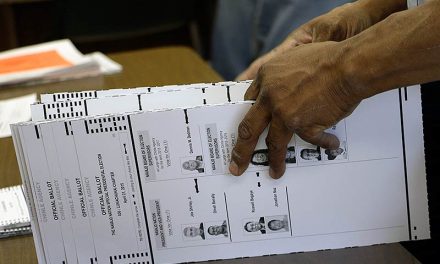
TC health workers get COVID shots as deadline nears
TÓNANEESDIZÍ
Under the threat of losing their jobs, more hospital employees who were hesitant about the coronavirus vaccine got inoculated, said two dissenting employees at Tuba City Regional Health Care Corporation.
The hospital’s effort to compel its employees to receive the COVID-19 vaccine before Nov. 9 appears to have boosted inoculation rates and pressured at least 40 of 87 dissenting employees to get the shot.
Their hesitancy is fueled by a combination of federal government mistrust and misinformation over the safety and efficacy of the vaccines.
“I don’t want to take the vaccine because we don’t know what’s in it,” said one of the employees, a Native female health-care worker, who asked anonymity.
“It’s still a test and (the nation’s health protection agency) is telling people, ‘Take it,’” said the woman, who’s requested a religious exemption to the hospital’s vaccine mandate.
“A lot of the stuff that people hear on the news, that’s not really true,” she said.
The Native female and another TCRHCC employee, a non-Native woman who agreed to go on record last Thursday but reconsidered her decision on Monday morning, met this reporter for an interview in Tuba City.
“Due to the mandates, we are losing front-line workers that fought through the pandemic without a vaccine,” said the non-Native woman, who’s requested a medical exemption.
“We have medical and religious exemptions, and they’re (TCRHCC leadership) are not honoring either of those,” she added. “It makes no sense to me for refusing medical (and) religious exemptions.”
The two women say TCRHCC employees who remain unvaccinated point to concerns about how quickly drug companies developed the vaccines and what their long-term health effects might be.
Vaccine innovation
Vaccination is a method of disease prevention that is relevant to people of all ages and in all countries, according to the New England Journal of Medicine.
It can improve people’s chance of survival, protect communities from new and re-emerging health threats, and enhance societal productivity.
But achieving vaccination involves more than the vaccines themselves, according to the journal.
The scientific community and vaccine industry over the last decade have been asked to respond urgently to epidemics of H1N1 influenza, Ebola, Zika, and now SARS-CoV-2 – the cause of COVID-19.
The non-Native woman said people are often told that the COVID-19 vaccines are immunogenic or can produce an immune response, meaning the vaccines produce antibodies that recognize this spike protein and can fight off the virus.
The vaccines contain ingredients that give one’s body instructions to produce the spike protein using the virus’s genetic code. So those who choose to take the vaccine are less likely to get severely sick.
“But we have that,” the non-Native woman said. “All you need to do is find out how you can strengthen your immunity.
“The (COVID-19) vaccines, yes, they have protein and other stuff (ingredients) … we can’t even pronounce,” she said. “All they do is kind of weaken your natural immunity.
“Your immunity warriors become the ushers when you get the vaccine,” she said. “So, any type of (disease) that’s out there, you’re easy to get it because of the vaccine, and that’s what people don’t realize. People … should be doing their research.”
The response to the coronavirus pandemic is an example of how fast new vaccines can be designed, according to the New England Journal.
By the time the World Health Organization declared COVID-19 a pandemic in early March 2020, at least 37 groups from biotechnology companies and academic institutions were working on vaccine candidates, including messenger RNA and spike-protein-based vaccines.
Unlike the Pfizer-BioNTech and Moderna vaccines, which store the instructions in single-strand RNA, the Johnson & Johnson (Janssen) vaccine uses double-strand DNA.
J & J’s vector-based vaccine uses a delivery vehicle, the “Adenovirus 26,” to deliver the protein into a person’s cells. But it cannot replicate in cells or cause illness, so it’s a safe delivery system.
Adenoviruses are common viruses that typically cause colds or flu-like symptoms.
Less than a year later, the first COVID-19 vaccine-efficacy trials were completed, and the first vaccines were authorized for emergency use.
The SARS-CoV-2 virus is a reminder of its destructive power, but coronaviruses are crucial to humans’ development and survival.
“All this time, we’ve been in front of patients through the whole pandemic,” the Native woman said. “Some of us didn’t get COVID-19, and some of us did.
“We took care of ourselves,” she said. “We know how to build up our immunity, and we know how to protect ourselves. We still haven’t gotten COVID-19. We did it the natural way.”
Vaccine skepticism
Adults and children as young as 5 years old have the opportunity to receive the COVID-19 vaccine. This also means that many people don’t want to be vaccinated – at least not yet.
The dissenting employees said there are many reasons for vaccine hesitancy, which develop through preexisting beliefs that are centered on many things, including medicine, religion, and government.
“Native Americans have been told not to trust the government all these years,” the Native woman said. “Why should we (suddenly) trust (it) because of the vaccine? We have our own belief. We have our own way of dealing with certain sicknesses.
“All we’re being given are medications,” said the woman, who’s frustrated by Americans blaming the unvaccinated for the lingering pandemic.
While vaccines are highly protective against serious illness, the Native woman added that breakthrough infections can happen, and the unvaccinated are likely to end up hospitalized from COVID-19 as a vaccinated person.
The non-Native woman said she’s always been exempt from specific vaccine requirements for medical reasons since she was a child.
“The medical review panel denied (my exemption request) twice, saying they follow (Centers for Disease Control and Prevention) guidelines,” the non-Native woman said. “I feel there has not been enough studies or research.”
But vaccination rates have increased in the Tuba City Service Unit, said Lynette Bonar, TCRHCC’s CEO.
“TCRHCC visits amongst fully vaccinated individuals remain low and occur much less frequently than among unvaccinated individuals,” Bonar explained.
“COVID immunization of health-care workers is endorsed by every reputable health-care organization in the United States,” she added. “Many other hospital systems have already mandated COVID vaccinations for their employees as the best way to make sure their staff and patients are protected from COVID-19 infections.
“Our only concern is the safety of our staff and our patients,” she said.
Bonar did not immediately respond to a request for a follow-up interview.
As a public service, the Navajo Times is making all coverage of the coronavirus pandemic fully available on its website. Please support the Times by subscribing.
How to protect yourself and others.
Why masks work. Which masks are best.
Resources for coronavirus assistance








 Highway 264,
Highway 264, I-40, WB @ Winslow
I-40, WB @ Winslow